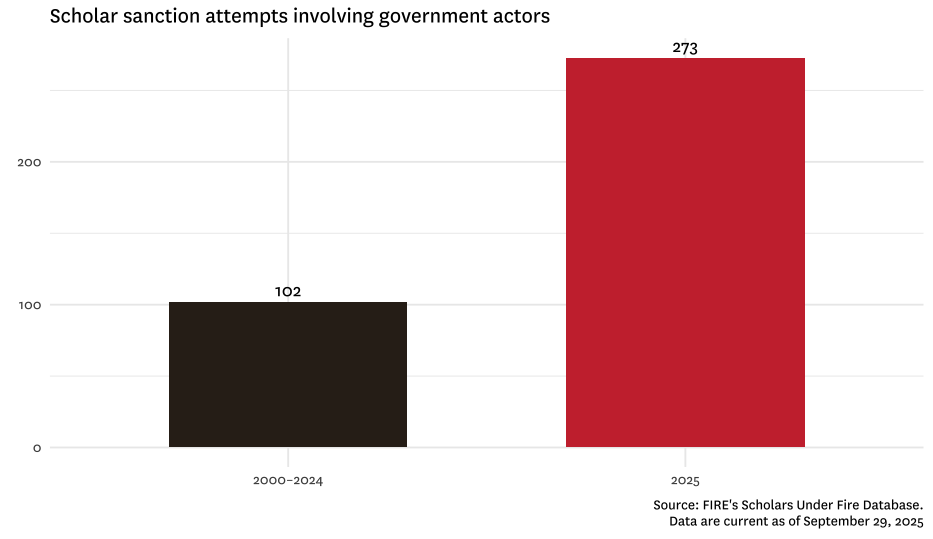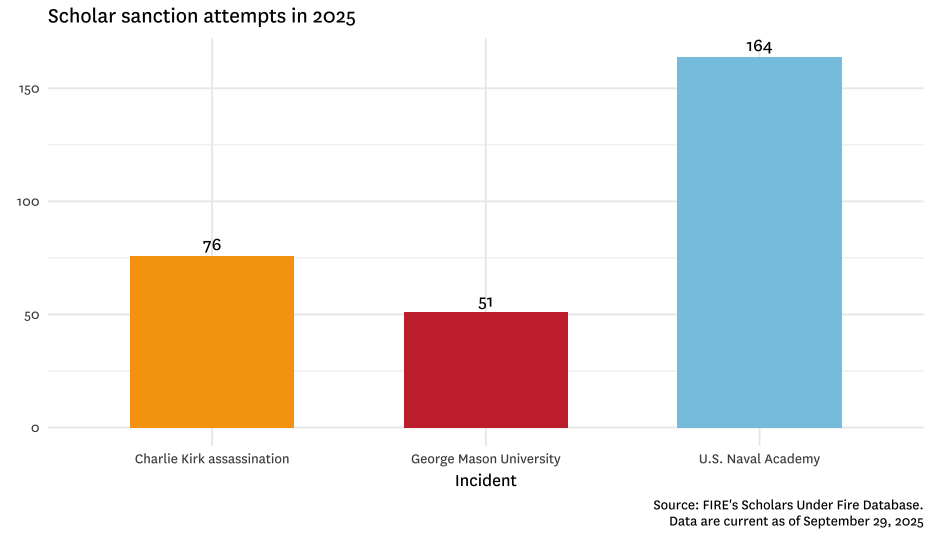The government is now the leading threat to faculty expression
77% of all sanctions efforts involve government actors
Forty-seven. That’s how many entries we added to our Scholars Under Fire database in the past week, upping this year’s already record total to 356.
The database tracks attempts to sanction scholars for protected speech and includes things like calls for firing or investigation. But this year, government actors make up roughly three-quarters of all cases — 67x the rate of the past 25 years.
How dramatic a departure is this? From 2000 through 2024, students, faculty, and off-campus activists participated in 76% of sanction efforts, while government actors were involved in just 8%, or about four incidents per year. That’s 102 incidents over 25 years. But this year alone, government officials have already been tied to 273 attempts.
Initially, this year’s spike was primarily due to the U.S. Naval Academy’s temporary removal of 381 titles from its library and the federal government investigating George Mason University’s entire faculty senate. But that’s no longer the case. Over the past three weeks, the general public and government actors have targeted 76 scholars for social media posts about Charlie Kirk.
The problem is metastatizing.
In California, UC Berkeley complied with a demand by the Department of Education’s Office of Civil Rights and turned over the names of 160 students, faculty, and staff for “potential connection to reports of alleged antisemitism.” The feminist philosopher Judith Butler, one of the professors named in the file, compared the situation to the McCarthy era and said the university’s compliance “represents a breathtaking breach of trust, ethics, and justice.”
The University of Houston and University of Texas systems voted to disband all faculty senates to comply with state Senate Bill 37, which gives university boards and presidents control over faculty governance. University of Florida system Chancellor Ray Rodrigues ordered punishments for faculty and students who celebrate or excuse Charlie Kirk’s assassination. And in Indiana, Attorney General Todd Rokita launched the Eyes on Education platform, framed as guidance for parents to challenge curricula, pronoun rules, and library content — but it functions more as a system that encourages citizens to monitor educators’ social media posts for thoughtcrimes.
This wave of government sanctions is more than chilling. It’s meant to silence scholars and teach universities that compliance is safer than resistance. But history shows where this path leads. Once politicians gain the power to decide which ideas are acceptable, they rarely stop at the campus gates, and when free inquiry collapses, democracy is not far behind.
That’s why the response cannot be passive. Faculty must band together. Colleges and universities must resist intimidation. And the public must recognize that academic freedom is their freedom too. Protecting it now is the only way to ensure it’s there for future generations.








False. I’m a tenured full time faculty member and the government is not even close to the biggest threat. It’s other faculty, students, and administrators.
I keep quiet constantly out of fear of someone putting a target on my back. I’m a centrist, former democrat, and there are many many topics I would teach and research that I simply don’t out of fear.
You cannot compare this to faculty impulsively and stupidly celebrating Kirk’s death. I don’t think there should be sanctions for such celebrations but the government pales by comparison to the far more pervasive restrictions imposed by an ideological monoculture
Zero chance your numbers are anywhere near accurate... labeling a group as thought police, but then not including any mention of censorship in relation to covid... I read this post 3 times thinking this has to be a farce page based solely on the numbers cited from 2000 to 2024